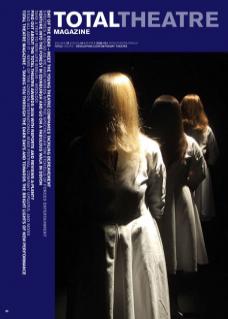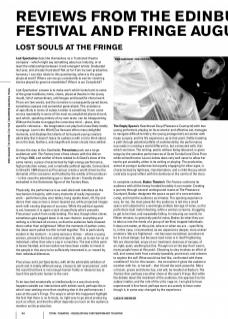Lost Spectacles describe themselves as a ‘frustrated theatre company’– which might say something about our industry, or at least the relationships between it and emergent artists. Graduated last year, and already frustrated! Not so far from my own graduation, however, I can also relate to this questioning; where is the great physical work? Where can we go consistently to see far-reaching stories played by genuine ensembles? Where is our Complicité?
Lost Spectacles’ answer is to make work which looks back to some of the great traditions; mime, clown, physical theatre in the Lecoq mould, full of extraordinary, odd images and beautiful choral work. There are few words, and the narrative is consequently pared down, sometimes opaque and somewhat generalised. This avoidance of specificity in terms of subject matter is something I have come across repeatedly in some of the most accomplished physical work, and which, speaking entirely of my own taste, can be disappointing. Without the hooks to engage the conscious mind – place, time, specific reference – the imagination can play but is less likely totally to engage. Lost in the Wind (Zoo Venues) offers many delightful moments, and displays the talents of its buoyant young creators admirably. But it doesn’t leave its audience with a lot to think about once the dust, feathers, and magnificent snow-clouds have settled.
Across the way at Zoo Southside, Precarious pack out a large auditorium with The Factory (one of two shows with this title on at Fringe 2008, and neither of them related to Al Seed’s show of the same name), a piece characterised by high-energy performance, high production values, and a markedly political agenda. Connections to Orwell’s 1984 abound as Precarious create a world driven by the demands of the consumer and fuelled by the avidity of the producer – in this case the advertising guru / slave driver / friendly dictator embodied in the Dickensian figure of the Factory Boss.
Physically, the performance is as well-oiled and relentless as the mechanism it depicts, with many moments of really impressive work – performers play over tables, hang upside down, lift, flip and dance their way across a clever layered set, while projected images work with varying degrees of success. While the political agenda is set, however, it is again a lack of specificity which prevents Precarious’ punch from really landing. The text, though often clever, sometimes gets bogged down in its own rhetoric; everything and nothing is criticised all at once, so that the audience feels dresseddown rather than enlightened. When the moments of pathos come, the ideas seem pulled too thin to hold together. This is particularly evident in the moment – in some senses a climax – where a young woman, pinned to the back wall and spot-lit, asks us to see her as an individual, rather than only a cog in a machine. The text at this point is heavy-handed, and we realise we have been unable to invest in the people in this story to be sufficiently interested in, or moved by, their individual dilemmas.
Precarious and Lost Spectacles, with all the admirable ambition of youth and in totally different ways, choose to tell ‘everystories’, with the result that there is not enough human frailty or idiosyncrasy to touch this particular human to the core.
To be touched emotionally or intellectually in a way that rarely happens outside our interactions with artistic work; perhaps this is what I was seeking more than anything else in the performances I saw at this year’s Fringe. The ways in which this happened highlight the fact that there is no formula, no right way to go about producing such an effect, and that the effect depends as much on the audience member as the production.
The Empty Space’s Heartbreak Soup (Pleasance Courtyard) with two young performers playing on its economic and effective set, manages to navigate difficult territory; the young protagonist’s encounter with major surgery, and his life experience up to that point. Deftly treading a path through potential pitfalls of sentimentality, the performance succeeds in creating a world different to, but connected with, that which we know. The writing, poetic without being laboured, is given wings by the sensitive performances of Scott Turnbull and Chris Price while writer/director Laura Lindow does very well never to allow her text to get unwieldy, either in its writing or playing. The production, aimed at younger audiences but equally engaging for other ages, is characterised by lightness, transformation, and a child-like joy which contrasts to great effect with the darkness at the centre of the story.
In complete contrast, Badac Theatre’s The Factory confronts its audience with all the heavy-handed brutality it can muster. Creating a journey through several underground rooms at The Pleasance Courtyard, Badac designate the space as part of a concentration camp, and treat the audience as inmates. The opening experience was, for me, the most powerful: the audience is led into a small space and subjected to a seemingly endless barrage of noise, as the performers beat metal sheeting, while a woman screams, struggling to get to her feet, and repeatedly falling. In reducing our world, for fifteen minutes, to genuinely painful noise, Badac do what they can to take us into the minds of a group of terrified, trapped individuals. It does not matter, at this point, where or when we are – specificity is, in this case, circumvented, as we experience deeper, more animal emotions. We are frightened – not because we believe ourselves to be in actual danger, but because loud noise is in itself frightening. We are disoriented, angry at our treatment, desirous of escape, of air, light, quiet, anything but this. Though not on the day that I saw it, many people leave at this point. Choosing to stay involves an effort of will, and comes both from curiosity (possibly, prurience), and a desire to explore the self. What would we feel like, confronted with these conditions? It is for this reason – the encounter it gives the audience member with his- or herself – that I found the work powerful. More criticism, praise and blame has, and will, be levelled at Badac’s The Factory than perhaps any other show at this year’s Fringe. But while the debate about the treatment of the audience, the approach to the subject matter, and the role of the critic rage on, I am glad to have experienced it first-hand, perhaps more accurately to have come though it, in some way changed by the experience.

